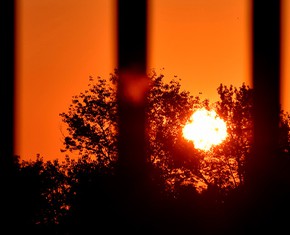The views expressed in our content reflect individual perspectives and do not represent the authoritative views of the Baha'i Faith.
Having grown up in the tradition of the Baha’i Faith, regular daily devotions were always part of our household practice – including my parents saying prayers with me from a young age.
The Baha’i book of laws – Baha’u’llah’s Most Holy Book – includes a directive to “recite ye the verses of God every morn and eventide.” Prayer, the Baha’i writings say, is one of the primary laws and teachings proclaimed in every religion. In his Book of Certitude, Baha’u’llah wrote:
… in every Dispensation the law concerning prayer hath been emphasized and universally enforced. To this testify the recorded traditions ascribed to the lights that have emanated from the Daystar of Truth …
The traditions established the fact that in all Dispensations the law of prayer hath constituted a fundamental element of the Revelation of all the Prophets of God – a law the form and the manner of which hath been adapted to the varying requirements of every age.
RELATED: Nothing Sweeter: Nurturing a Practice of Prayer
Admittedly, I have “fallen off the wagon” of prayer a bit recently, because of a new, young dog that takes my time in the mornings – but writing this article is reminding me of the importance of this spiritual guidance. I recall a framed saying of my mothers with similar advice: “when your day is hemmed with prayer, it is less likely to unravel.”
The directives regarding prayer from Baha’u’llah’s Most Holy Book say that we should:
… read ye the sacred verses in such measure that ye be not overcome by languor and despondency. Lay not upon your souls that which will weary them and weigh them down, but rather what will lighten and uplift them, so that they may soar on the wings of Divine verses towards the Dawning-place of His manifest signs.
I interpret this to mean that prayer and worship should not become a chore or a burden, but a time that we look forward to – to say specific prayers, to center ourselves, to be in silence, to mindfully meditate, or to commune with spirit in our own unique ways.
Other parts of the Baha’i writings say, in effect, that meditating on a short verse with joy is preferable to reading copious scriptures with boredom. I like the practical nature of this advice, which focuses more on the attitude that we should try to aspire to instead of just adopting a rote practice. For me personally, seeing the grandeur of God in a natural environment or listening to beautiful, spiritually uplifting music often connects me more to the divine than reading words on a page. Either way, it’s that daily “tuning in” that is important. Here is another passage from the Baha’i writings along those lines, written by Abdu’l-Baha:
For a lover, there is no greater pleasure than to converse with his beloved, and for a seeker, there is no greater bounty than intimacy with the object of his desire. It is the greatest longing of every soul who is attracted to the Kingdom of God to find time to turn with entire devotion to his Beloved, so as to seek His bounty and blessing and immerse himself in the ocean of communion, entreaty and supplication. Moreover, obligatory prayer and fasting produce awareness and awakening in man, and are conducive to his protection and preservation from tests.
The Baha’i teachings further define the “verses of God” as “all that hath been sent down from the Heaven of Divine Utterance.” As a student of humanity’s spiritual heritage (see my website at www.thesoulsalons.com), I love the openness in the Baha’i Faith to the long history of divine guidance from all religions. Baha’is believe that religion is progressive or, in other words, that the teachings of all the world’s major religions build on each other along our individual and collective paths to spiritual growth. I often read scriptures from other faiths and find so many common themes among them.
RELATED: 6 Tips for Your Daily Prayers
Prayer, including obligatory prayers said at certain times of the day, is a regular practice for Baha’is, but worship and prayer is a central tenet of most faith traditions. In the words of Thomas Merton, a prominent Catholic monk and philosopher:
All religious traditions have ways of integrating the senses, on their own level, into higher forms of prayer. The great mystical literature speaks not only of ‘darkness’ and ‘unknowing’ but also, and almost in the same breath, of an extraordinary flowering of ‘spiritual senses’ … and more direct union with God ‘beyond experience.’
I also quite like a saying from Islam about prayer – called a hadith – that I came across recently: “There is a polish for everything that becomes rusty, and the polish for the heart is the remembrance of God.”
Prayer really does polish the soul. The concept of cleansing the mirror of the heart from the dross and dust of worldly desires and attachments constitutes a common theme in the world’s spiritual literature. Our latent potentialities can be revealed when we consciously choose to polish that mirror each day. As the Baha’i writings say, “O My Brother! A pure heart is as a mirror; cleanse it with the burnish of love and severance from all save God, that the true sun may shine therein and the eternal morning dawn.”
A different version of this article first appeared as a guest column in The Arizona Republic newspaper.
















Comments
Sign in or create an account
Continue with Googleor